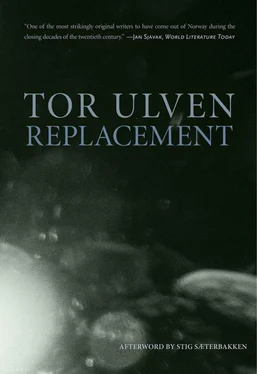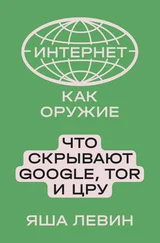As opposed to the strong tendency in literary traditions to attribute human qualities to nature, in Ulven’s texts a desouling rather than an ensouling takes place. When he describes a tree, he’s talking about the tree itself, how it’s shaped, how it looks silhouetted against the sky, how it’s perceived by the never resting, never not sensing, never not thinking I. It’s the mystery of the concrete. The tree’s existence is unfathomable enough without piling on a bunch of soulful or symbolic traits to boot! In this sense, there’s something rebellious in Ulven’s work, as when the contemplative stillness that forms his modus operandi suddenly gives way to a bout of anger, when the text abruptly “snaps,” as my daughter would say, and exhibits a biting, snarling fury, for example when one of the protagonists in Replacement vents his contempt for the subservient masses’ blind subsumption into the system, an emotion expressed by the surprisingly conventional image of mice on a wheel, although the very conventionality of the phrase underscores and strengthens the spontaneity of the outburst.
This reification, which is found throughout Ulven’s texts, also extends to people, whose basic existence is described in terms of the organic-mechanical process of which it actually consists. This idea is often expressed in striking aphoristic phrases like “To your / heart // you mean / nothing” (from Etterlatte dikt [Posthumous Poems]). This thought introduces a tragic dimension into our self-perception, revealing a fissure in what we’re used to perceiving as a whole. At the same time, one could almost say there’s something blissful about this idea, something that frees us from our traditional self-image, tears us loose from the stiffened humanistic forms of representation, and gives us a much-needed sense of meaninglessness with almost paradisiacal overtones (Ulven’s volume of selected poetry is called Det verdiløse [The Worthless], a title I read as decidedly positive.)
At this point, we’ve returned to the rebellious, if not to say the most radical, aspect of Ulven’s work. It’s not the absence of meaning that is the problem of Modern Man. The problem is that there’s too much. There’s far too much of it. In Replacement , we encounter a memory in the following way: “he”—who? someone! — sits beside the sea, stares out across the water and suddenly sees an object that he at first thinks is a bottle, or maybe a message in a bottle, then a cigarette case, which the wind blows toward land, until finally it resolves into a wooden board, a sodden, perfectly smooth board, nothing more and nothing less, which comes to rest against the beach, where it beats time to the waves. However, the object’s utter irrelevance — its meaninglessness — isn’t described in terms of disappointment (juxtaposed against the expectation of something exciting or adventurous), but just the opposite: it’s described as a relief, a release. As if it’s a blessing to discover that little piece of nothing drifting along. A board. A stupid piece of wood. A useless piece of driftwood. And that’s it.
No symbols where none intended. In Ulven’s texts, all phenomena, whether dead or alive, have the same meaning, the same weight, if you will. Everything is equally real, equally meaningful, or just the opposite: equally meaningless. It’s Ulven’s strategy for placing himself on the same level as his surroundings. He’s always equally precise, equally accurate, no matter what catches his eye or occupies his thoughts. In short, this linguistic precision represents in itself an embrace of the world. To describe this hand, this heart, this rock, this grass, this leaf in the grass, these dew drops on this leaf in this grass in this garden, to precisely express the existence of it all, is the true literary feat.
It’s not the world in a nutshell, but it’s the world in a backyard garden in Årvoll in Oslo. By placing such stark limitations on his repertoire of motifs, Ulven gives himself access to an enormous range of registers, a huge and richly varied series of approaches to the art of description. Great expansions result from great reductions. And he pushes the limits of both extremes, in terms of what it’s possible to sense (for example, to see), and what it’s possible to think (for example, about what we see) or to imagine (for example, as an extension of what we see). The source of Ulven’s relentless desire to find new and more meticulous ways to describe (the same) things, which forms an immutable constant in his work, the driving force behind everything he writes, is the intensity of the experience of living, that overwhelming, I’m tempted to say sickly presence, every single hour, every single minute of every single day of our lives.
*
The protagonist in Replacement , or the first one we meet, anyway, is a ninety-nine year old man. We know this because he’s twice as old as the bullets in the loaded gun he always keeps within reach, there in a bedroom that’s seemingly remained unchanged since his childhood days. The nameless — and “throatless”!—old man seems closely related to the dying old man in Beckett’s Stirrings Still . He begins as a “he,” who eventually becomes a “you,” and then later a “he” again. That is, if it’s the same person. If it’s not really a multitude of he s and you s, whose paths cross at random points in a continuous stream. At any rate, they bleed into one another: past, present, fantasy. An amorous excursion, a lovestruck young man on his way to meet his heart’s desire in the nighttime, while his parents think he’s safe in bed, gives way almost imperceptibly to a night watchman making the rounds in a shabby industrial building, a scene taken from the time the young man — assuming it’s the same man — must’ve worked for a security company. In this way, the text shifts effortlessly between different times, and possibly between different identities.
If it’s not imagination itself that is the actual protagonist here — the ghost in the reality machine, responsible for organizing and archiving this immense store of memories, belonging to who knows how many people: a consciousness that reveals itself through explicit reflections concerning the pressing task of processing the whole. The novel is filled with such small, corrective insertions: “if something asphalted can be called a ‘floor,’” or: “let us say,” or: “so to speak,” or: “in other words,” or: “if truth be told,” or “one might say,” as if it’s really the writing process, or the emergence of the thought process itself that we’re witnessing, not the events recounted. Language creates what it describes. In this way, a veil is drawn over events, the veil of observation and consciousness, which on one hand separates the people in the novel — and us as readers — from direct contact with experience, but on the other side enables a renewed contact with that same experience through Ulven’s linguistic precision: dark, vague occurrences become distinct objects of perception in the here and now. Immediacy disappears, precision remains.
Replacement abounds with the quotidian, the everyday, a lowest existential multiple, as it were, constructed through a series of ordinary tableaus showing people slogging their way through minor events, routines, trivialities, the day’s store of mundane activities: an evening stroll past a racetrack or a walk to and from the store; deliberations as to whether or not it’s worth the effort to stretch out an arm and turn off — or on — the light; a quilt sliding off the bed and lying like a shapeless deadweight on the floor; the urge to piss, which sneaks up gradually and then mercilessly takes priority over every other desire. Everything is anchored in this type of trivia. He (the nameless protagonist) needs a cigarette and hunts through his pockets and drawers for a pack, and then proceeds to hunt through his pockets and drawers for a lighter. Or he searches (just as feverishly) through the fridge for a beer, touchingly optimistic regarding the possibility of uncovering a surprise stash somewhere in the back, somewhere in the depths, somewhere down below. Or he lies in bed (as an old man) and studies a fly’s Sisyphean path around the inside of the ceiling light. Or (as a boy) he trembles in fear of the monster lurking beneath (the same?) bed and fantasizes, as if in a fever dream, of building a machine that’s capable of literally sweeping the monster away. Trifles are seen as the great battles of life. Elementary things are represented in visionary terms.
Читать дальше












